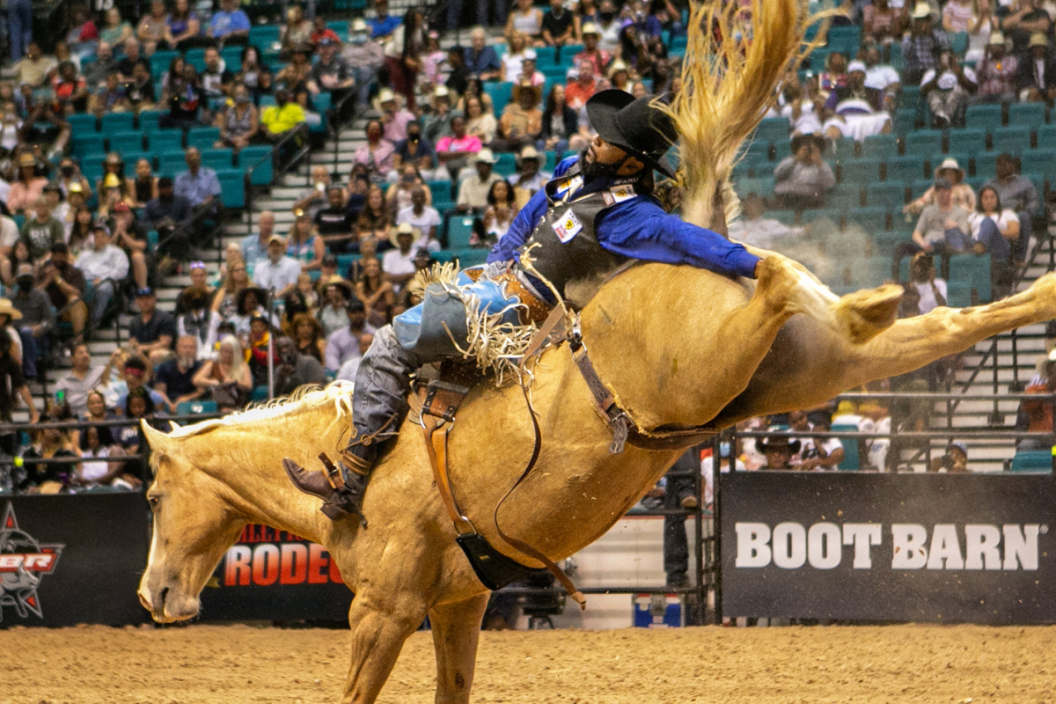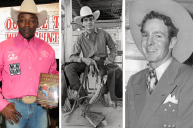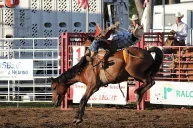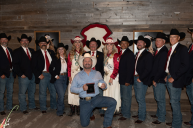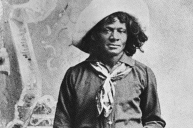With Lil Nas X's country & western/rap hit "Old Town Road" in 2019 and Netflix's 2021 hard charging western The Harder They Fall, it seems like a whole new generation is being introduced to Black cowboys. Not that they ever went away.
The Bill Pickett Invitational Rodeo (BPIR) has been paying homage to Black cowboys and cowgirls since 1984. More than 130,000 fans annually flock to the only touring Black Rodeo competition, which travels to more than 30 cities across the US. Contestants, young and old(er) compete in events such as calf roping and bull riding and everything in between. In June 2021, it was the first All-Black Rodeo to be televised on network television when CBS aired it on Juneteenth.
Who Was Bill Pickett?
Founded by Lu Vason, the germ of an idea for the Bill Pickett Invitational Rodeo was born when he attended Wyoming's Cheyenne Frontier Days in 1977, according to the Bill Picket Invitational website. (Vason passed away at 76 years old in 2015 of a heart condition.) At the event, he didn't see any Black cowboys represented in the program and wondered if people knew about their role in history.
People knew the name Will Rogers, but who they hadn't heard of was Bill Pickett. And if they had, they didn't know he was Black.
Historians estimate one out of four cowboys were Black during the late 1800s. In the 1860s, enslaved people accounted for more than 30% of the population in Texas with more than 182,000 of them living there according to the census.
During the Civil War, when white Texans went off to fight, the enslaved people were left to maintain the land and cattle. They picked up cattle-tending skills, which came in handy when after the Civil War, when being a cowboy was one of the few opportunities open to Black men. They learned cattle herding skills from Mexican or Spanish cowboys, called "vaqueros," who were known for their superior skills in roping, riding, and herding.
In the early 1900s, Bill Pickett was considered the first Black cowboy star. The creator of steer wrestling, also known as bull dogging, was born in 1870, one of thirteen children, in West Texas. The descendant of Native Americans and Black slaves, he learned to ride and rope as a child. He left school after the fifth grade to become a ranch hand.
Pickett became famous for his technique of bulldogging, where he would jump from his horse and bite the steer's lip to pull it to the ground. He developed this method after watching the way herder dogs corralled the steer. This is known as steer wrestling and continues to be a mainstay in rodeos today. In 1888, he entered his first rodeo and later, he and his brothers opened a business together, Pickett Brother Bronco Busters and Rough Riders Association. They would break horses and tame cattle. By 1900, Pickett was performing in shows and exhibitions and was signed to the 101 Ranch Wild West Show in 1905. His handling of the wild and domestic animals added to his rising star. He picked up work as a cowboy and continued to compete in rodeos during the off seasons.
In the '20s, he would appear in two films that would cement his status as the first Black Cowboy star, the Crimson Skull (1921) and The Bull-Dogger (1922). An untimely death cut his career short on April 2, 1932, when he died from head injuries after being kicked by a horse at the 101 Ranch. He was buried on the ranch near the White Eagle Monument.
It would take some forty years before his accomplishments were recognized when he was inducted in the National Cowboy and Western Heritage Museum. Almost twenty years after that, Pickett was honored with a stamp as part of the US Postal service's Legends of the West stamp series in 1993. Unfortunately, in 1994 the Pickett family alerted the Postal Service that the photo was not Bill Pickett, but his brother Ben Pickett and new stamps had to reissued.
Although Bill Pickett was one of the most high-profile Black cowboys back then, there were plenty of other notable Black cowboys during that time, like Bass Reeves, Addison Jones and women like "Stagecoach" Mary Fields and Mary Ellen Pleasant. One of the more well-known was Nat Love (1854 - 1921). Born into slavery, he was taught how to read and write by his father. A champion roper, he published an autobiography in 1907 called Life and Adventures of Nat Love, Better Known in the Cattle Country as 'Deadwood Dick.'
The Netflix Western The Harder They Fall (billed as fictional) brought some of these real-life characters to life with Zazie Beetz as Stagecoach Mary, Jonathan Majors as Nat Love and Delroy Lindo as Bass Reeves.
What is the Bill Pickett Invitational Rodeo?
This is the rich history Vason drew upon to create the invitational. Billed as the "greatest show on dirt," Vason debuted the first invitational in Denver, Colorado. Now in its 38th year, it's helmed by Vason's widow, Valeria Howard Cunningham. Slowed, but not stopped by COVID, the show continues to tour and can be watched on Pluto and the Cowboy Channel.
"Celebrating 39 years is a huge milestone and reflects the importance of telling our stories, educating more people about the contributions of Black cowboys/cowgirls in the development of the West, and showcasing the Black cowboys/cowgirls' skills and contributions today," Cunningham says on Bill Pickett Invitational Rodeo site. Under Cunningham's helm, the company is powered by a majority female leadership.
The tour gives young girls such as Savannah Roberts a chance to compete and win prize money. She won the 2019 Bill Pickett Rodeo Ladies' Barrel Racing championship at just 11 years old and was the youngest person in the competition. Also in 2019, 8-year-old Harrel Williams Jr. won the Jr. Breakaway event, inspiring the next generation of rodeo stars.
The tour rides on coming to an arena near you.
